Предмет: Английский язык,
автор: Miа16
Английский язык.
Даю 50 баллов.
Сделать задания к тексту.
Текст будет сначала, а потом задания.
Приложения:
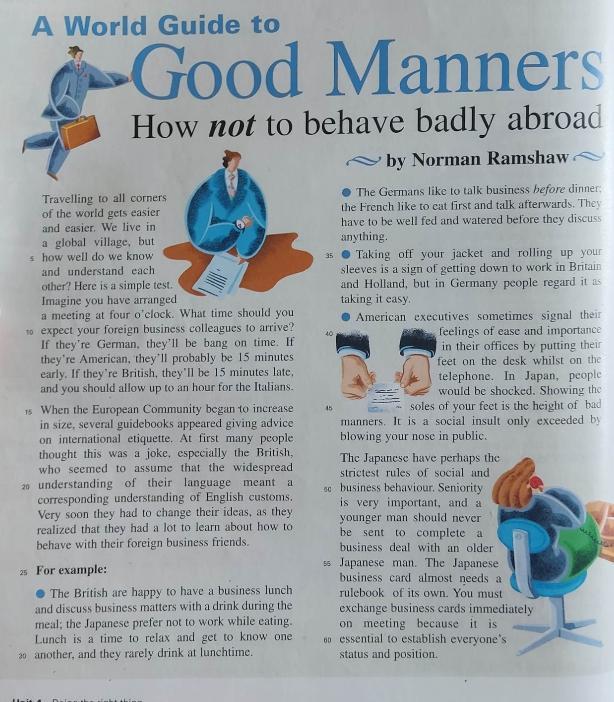
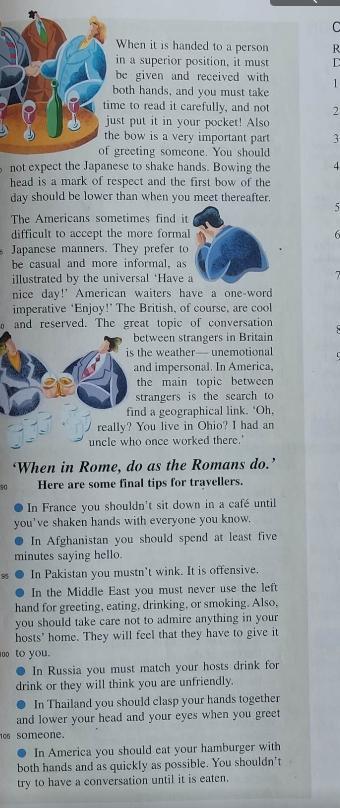

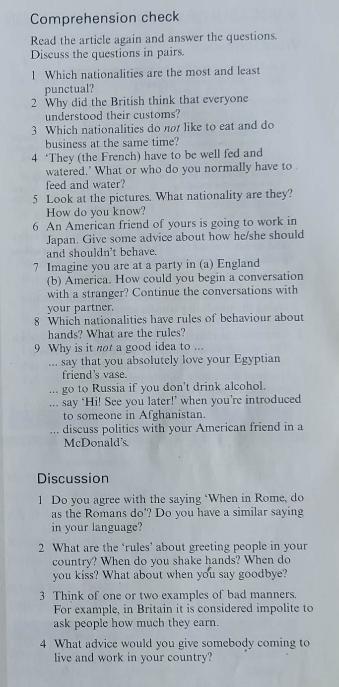
ajisjsjsksj:
Но там 25 баллов
Ответы
Автор ответа:
1
Ответ:
Reading
- Judging by the title, I think that the article will be quite light-hearted but will also have quite a lot of information in it. In my opinion, the heading starting with ‘how (not) to’ suggests an informal style of writing, but on the other hand, ‘guide’ means presenting a wide range of valid information.
- Facts about nationalities:
- The Japanese have a lot of rules.
- The Americans prefer to act casual.
- The British are cool and reserved.
- The Germans always arrive on time.
- The Italians are usually seriously late.
- The French like to talk business after dinner.
Comprehension check
- The most punctual of all are Germans and Americans as they are always on time or even earlier. The least punctual are Italians because they can be an hour late.
- They thought so, because everyone understood their language.
- The Japanese and the French don't like to eat and have business at the same time.
- We normally feed our pets and water our plants.
- The man with a briefcase is probably British or Italian because he seems to be late.
The man who is looking at his watch is German because he wants to be on time.
The hands with a business card probably belong to a Japanese person because in Japan, business cards handed to superiors are given and received with both hands.
The man sitting in a chair is an American because he has his feet on the table while talking on the phone.
The man in a cafe is French because he cannot sit before shaking hands with people he knows.
The man in blue is from Thailand because he has his hands clasped together and his head lowered.
Two men with beer are probably Russian because they've drunk the same amount of alcohol. - He/she should be polite to people who are older than him or are in a superior position.
He/she shouldn't discuss business while eating.
He/she shouldn't expect them to shake hands but bow his head instead.
He/she should learn to exchange business cards as soon as the meeting starts. - (a) England. Possible beginnings:
Nice weather, isn't it?
It looks like it's going to rain.
What an ugly day today!
(b) America. Possible beginnings:
Where are you from? Are you from New Jersey? You sound as if you're from the East of the country.
What part of the US are you from? - The Japanese never shake hands. When a business card is handed to a person in a superior position, it is given and received with both hands.
The French cannot sit down in a cafe until they've shaken hands with everyone they know.
In Middle East, your left hand cannot be used for greeting, eating, drinking and smoking.
In Thailand, you people clasp their hands as a part of greeting.
Americans eat hamburgers with both hands. - Case 1: The Egyptian friend will have to give the vase to you.
Case 2: Russians will consider your refusal to drink with them offensive.
Case 3: In Afghanistan, your greeting should last no less than five minutes.
Case 4: In America, you cannot talk while eating a burger.
Discussion
- Yes, I definitely agree with the saying. When you come to a different country, you are a guest, so it's not up to you to change the rules and customs of the said country. We also have a similar saying in Russian: "В чужой монастырь со своим уставом не ходят."
- In Russia, the greeting is usually verbal. Close friends might sometimes hug each other or invent their own way of saying hello, and business partners usually shake hands. Normally, people don't kiss each other. Saying goodbye can also be accompanied by hugs, but usually it is just verbal too.
- In Russia, walking in your outdoor shoes in your host's home is considered rude.
- I would advise them to bring lots of warm clothes as it can be quite cold in winter. Also, it would be best for them to learn a bit of Russian, because quite a lot of people there don't speak any foreign languages.
Объяснение:
Первое вложение: подчеркнуто подтверждение для Reading (#2)
Второе вложение: подчеркнуто подтверждение для Comprehension check (кроме #4 и #5)
Для остальных заданий подтверждение не требуется.
Приложения:
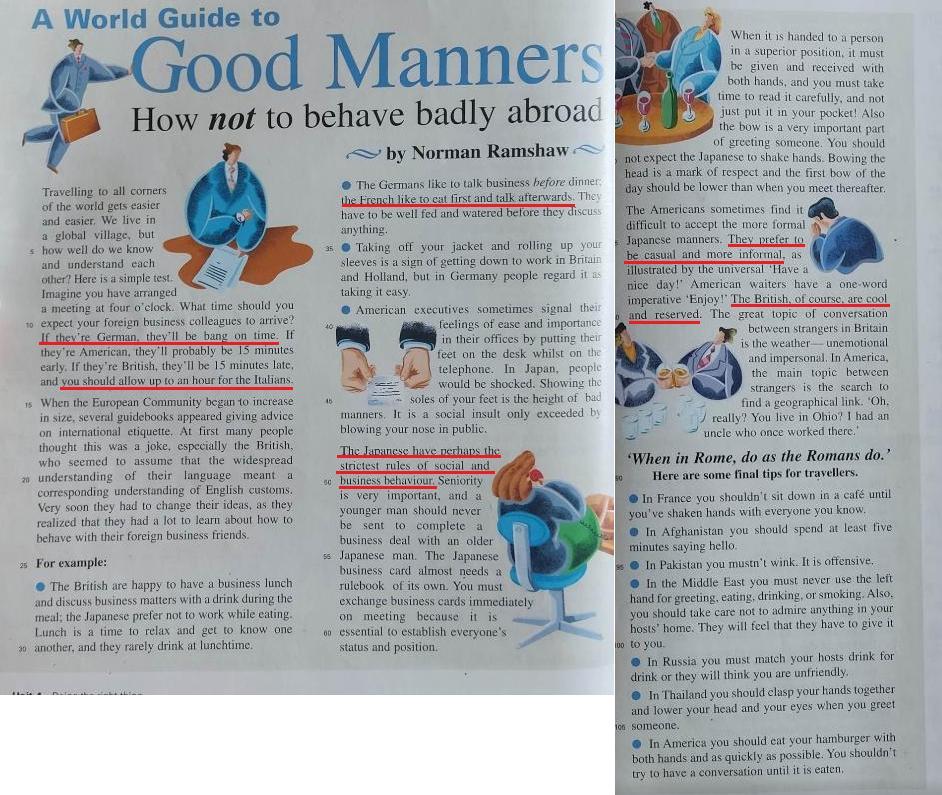
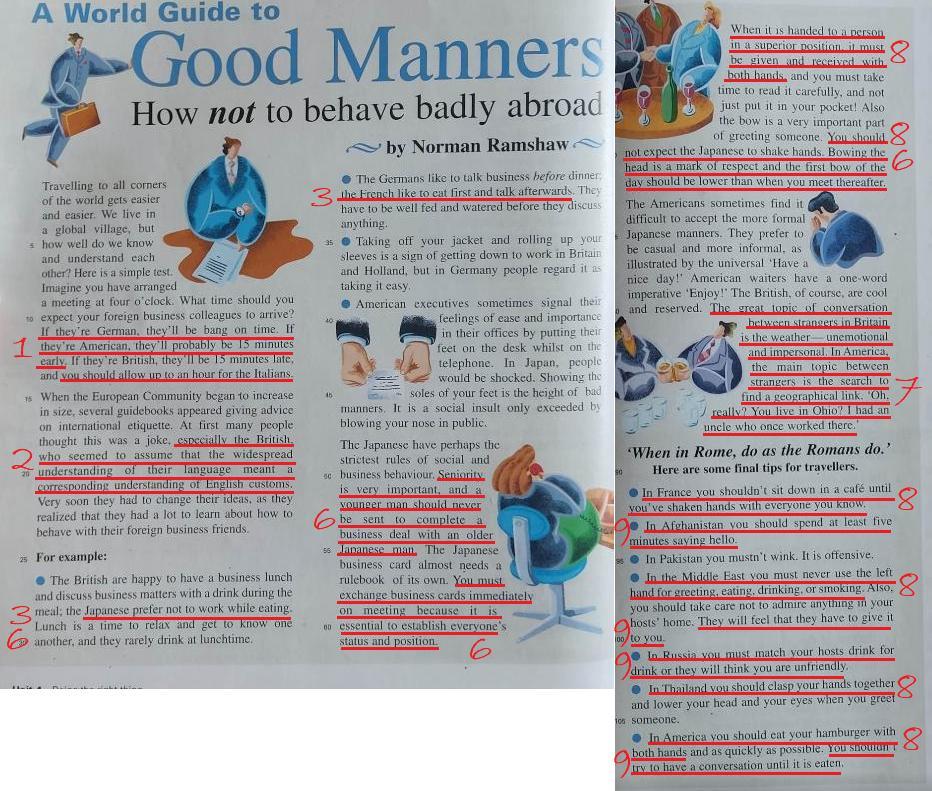
большоеееее спасибо))))
Пожалуйста
Похожие вопросы
Предмет: Русский язык,
автор: кристи409
Предмет: Русский язык,
автор: Аноним
Предмет: Другие предметы,
автор: lbvfglushenko
Предмет: Українська мова,
автор: Виталий180
Предмет: Алгебра,
автор: klimermolaev4